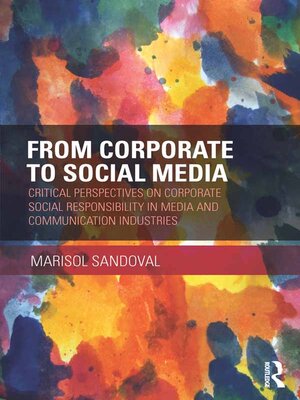From Corporate to Social Media
ebook ∣ Critical Perspectives on Corporate Social Responsibility in Media and Communication Industries · Routledge Advances in Sociology
By Marisol Sandoval

Sign up to save your library
With an OverDrive account, you can save your favorite libraries for at-a-glance information about availability. Find out more about OverDrive accounts.
Find this title in Libby, the library reading app by OverDrive.



Search for a digital library with this title
Title found at these libraries:
| Library Name | Distance |
|---|---|
| Loading... |
The corporate and the social are crucial themes of our times. In the first decade of the twenty-first century, both individual lives and society were shaped by capitalist crisis and the rise of social media. But what marks the distinctively social character of "social media"? And how does it relate to the wider social and economic context of contemporary capitalism? The concept of Corporate Social Responsibility (CSR) is based on the idea that a socially responsible capitalism is possible; this suggests that capitalist media corporations can not only enable social interaction and cooperation but also be socially responsible.
This book provides a critical and provocative perspective on Corporate Social Responsibility (CSR) in media and communication industries. It examines both the academic discourse on CSR and actual corporate practices in the media sector, offering a double critique that reveals contradictions between corporate interests and social responsibilities. Marisol Sandoval's political economic analysis of Apple, AT&T, Google, HP, Microsoft, News Corp, The Walt Disney Company and Vivendi shows that media and communication in the twenty-first century are confronted with fundamental social responsibility challenges.
From software patents and intellectual property rights to privacy on the Internet, from working conditions in electronics manufacturing to hidden flows of eWaste – this book encourages the reader to explore the multifaceted social (ir)responsibilities that shape commercial media landscapes today. It makes a compelling argument for thinking beyond the corporate in order to envision and bring about truly social media. It will interest students and scholars of media studies, cultural industry studies, sociology, information society studies, organization studies, political economy, business and management.







